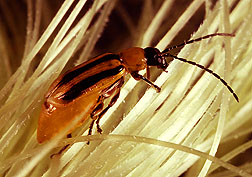This page has been archived and is being provided for reference purposes only. The page is no longer being updated, and therefore, links on the page may be invalid.
|
|
Corn Rootworms Pose First Challenge to Decades-Old Pest Control StrategyBy Don ComisFebruary 28, 2002 For the first time, corn rootworms--the most damaging pest of corn in the United States--recently changed their behavior and foiled crop rotation strategies long counted on to break their destructive cycle. Now Agricultural Research Service scientists hope a soon-to-be-completed 5-year cooperative research agreement with Monsanto Company, St. Louis, Mo., will help them regain the upper hand against the pest. In the study, the scientists are using a 2-in-1 cornfield strategy--a mix of transgenic and nontransgenic corn plants--against the rootworms. The transgenic plants have been genetically engineered to produce Bacillus thuriengensis (Bt) insecticide. For many years, farmers could confidently reduce rootworm numbers by switching their cornfields to soybeans every other year, planting corn elsewhere on their farms. The rootworms would starve to death after hatching in a soybean field the next spring. But, in recent years, farmers noticed that adult western corn rootworm beetles were flying out of the cornfields to lay eggs in soybean fields that would become cornfields the next spring when their hungry worm offspring hatched in the soil. To make matters worse, more eggs of their northern brethren started taking two years to hatch, timing their offspring perfectly for a 2-year, corn-soybean-corn rotation. And western rootworms have developed resistance to insecticides applied in fields planted to corn every year. To counter the pests' ability to adapt to various control tactics, ARS scientists are studying the resistant-insect management strategy of interplanting regular corn plants among transgenic corn plants. The idea is to delay possible development of resistance by giving any adults that fed on the transgenic corn plants--and survived--the opportunity to mate with other, non-Bt-challenged beetles, which fed on regular corn. ARS is the U.S. Department of Agriculture's chief scientific research agency. |

